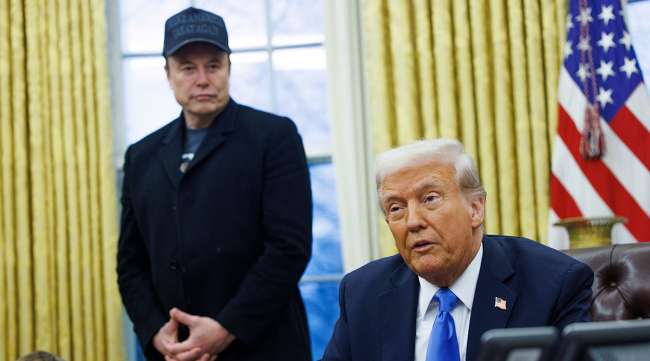Elon Musk and Donald Trump in the Oval Office in February. (Aaron Schwartz/Bloomberg News)
Tesla Inc.’s shares sank as Elon Musk and President Donald Trump’s simmering feud devolved into a public war of words between two of the world’s most powerful people.
Trump on June 5 said that he was “very disappointed” by the Tesla CEO’s criticism of the president’s signature tax policy bill. Musk fired back in several social media posts, saying in one that “without me, Trump would have lost the election.”
The president later floated terminating federal contracts and subsidies extended to Musk’s companies and said he had asked the Tesla and SpaceX leader to leave his administration, which Musk said was a “lie.” Musk went a step further late in the day, saying he would decommission a SpaceX craft used by the U.S.
Tesla’s shares dropped 14% on June 5 in New York, the stock’s biggest decline since March 10. The rout erased about $150 billion from the electric vehicle maker’s market value. The stock fell another 2.2% as of 4:39 p.m. in post-market trading.

The spectacle of the world’s richest person and the leader of the free world lobbing insults toward one another on social media marks a stunning breakup of a once formidable political alliance.
Musk spent more than $250 million to help secure Trump’s return to the White House. Trump in turn deputized Musk to lead a sweeping effort to slash government spending and reshape the federal bureaucracy before the mercurial billionaire stepped back from that role last week.
Ross Gerber, the CEO of Tesla shareholder Gerber Kawasaki, sharply criticized Musk’s behavior in a Bloomberg TV interview, saying it could lead to lawsuits from the automaker’s investors and cut the value of SpaceX in half.
“Elon isn’t functioning to the benefit of his shareholders,” said Gerber, whose firm has substantially reduced its Tesla holdings over the last few years. The meltdown is leading to the “dismantling of the Musk empire in real time.”
The conflict raises the specter of Trump wielding government powers to retaliate against Musk’s companies, similar to actions the president has taken to attack other perceived enemies, such as Harvard University.

A Tesla showroom in West Bloomfield, Mich. (Emily Elconin/Bloomberg News)
It also injects doubts about whether Trump’s administration will deliver key policy changes Musk has sought, namely a framework that would liberalize deployment of autonomous vehicles that Musk has said are critical to Tesla’s future and its market value.
RELATED: Tesla Targets June 12 Rollout of Robotaxi Service in Austin
Already, policies being advanced by Trump and Republican lawmakers are putting billions of dollars at risk for Tesla, which is by far Musk’s largest business.
Trump’s massive tax bill would largely eliminate a credit worth as much as $7,500 for buyers of some Tesla models and other electric vehicles by the end of this year, seven years ahead of schedule. That would translate to a roughly $1.2 billion hit to Tesla’s full-year profit, according to JPMorgan analysts.
RELATED: House Backs Electric Vehicle, Hybrid Fees in Budget Bill
After leaving his formal advisory role in the White House last week, Musk has been on a mission to block the president’s signature tax bill that he described as a “disgusting abomination.” The world’s richest person has been lobbying Republican lawmakers — including making a direct appeal to House Speaker Mike Johnson — to preserve the valuable EV tax credits in the legislation.
Separate legislation passed by the Senate attacking California’s EV sales mandates poses another $2 billion headwind for Tesla’s sales of regulatory credits, according to JPMorgan.
Taken together, those measures threaten roughly half of the more than $6 billion in earnings before interest and taxes that Wall Street expects Tesla to post this year, analysts led by Ryan Brinkman said in a May 30 report.
Tesla didn’t respond to requests for comment.
The House-passed tax bill would aggressively phase out tax credits for the production of clean electricity and other sources years earlier than scheduled. It also includes stringent restrictions on the use of Chinese components and materials that analysts said would render the credits useless and limits the ability of companies to sell the tax credits to third parties.
Tesla’s division focused on solar systems and batteries separately criticized the Republican bill for gutting clean energy tax credits, saying that “abruptly ending” the incentives would threaten U.S. energy independence and the reliability of the power grid.
The clean energy and EV policies under threat were largely enacted as part of former President Joe Biden’s Inflation Reduction Act. The law was designed to encourage companies to build a domestic supply chain for clean energy and electric vehicles, giving companies more money if they produce more batteries and EVs in the U.S. Tesla has a broad domestic footprint, including car factories in Texas and California, a lithium refinery and battery plants.
With those Biden-era policies in place, US EV sales rose 7.3% to a record 1.3 million vehicles last year, according to Cox Automotive data.






